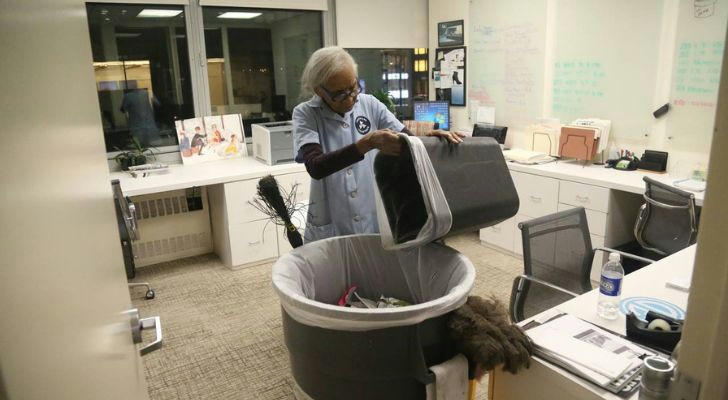Office Cleaning Jobs in 2025: What You Need to Know About Pay, Perks, and Landing the Role
The demand for office cleaners has surged in the post-pandemic era, with businesses prioritizing hygiene and sanitation like never before. Whether you’re seeking flexible hours, competitive pay, or a stable career path, office cleaning jobs offer opportunities that go far beyond a mop and bucket. Let’s dive into the latest data, benefits, and strategies to secure these roles—and why now is the perfect time to act.

Breaking Down the Paycheck: What Office Cleaners Earn Hourly
Office cleaners in the U.S. now earn an average of $13.20–$16.50 per hour, with annual salaries ranging from $27,453 (national average) to $32,538 in high-paying states like Washington. But location and industry play starring roles:
- 📍 Top-paying cities: Chicago leads in job demand, while Washington state offers the highest wages.
- 💼 Industry variations: Cleaners in finance and tech sectors earn 12–18% more than those in manufacturing.
- 🎓 Education boosts pay: An Associate degree adds $1,500+ to annual earnings compared to high school graduates.
Why this matters: The gap between entry-level and experienced roles is narrowing. Employers increasingly value certifications in eco-friendly cleaning or equipment operation, which can push hourly rates toward $18–$20.
5 Hidden Benefits That Make Office Cleaning Jobs Worth It
Beyond the paycheck, office cleaning roles offer perks that other entry-level jobs rarely match:
1.🕒 Flexible schedules: Night shifts, part-time gigs, and weekend work let you balance family or education.
2.📈 Career growth: Many companies promote from within. Example: Maria Lopez (Houston) started as a cleaner and now manages a 20-person team.
3.🏥 Healthcare and retirement plans: Full-time roles often include benefits—41% of cleaners in large companies get insurance.
4.🌱 Green cleaning training: Learn to use IoT-enabled devices or non-toxic solutions, skills that future-proof your career.
5.🚪 Low barriers to entry: No college degree? No problem. Bilingual skills (Spanish fluency boosts hiring odds by 35%) or reliability matter more.
Pro tip: Target companies with 500+ employees—they’re 22% more likely to offer advancement programs.
Where the Jobs Are: Industries and Locations Hiring Now
The office cleaning boom isn’t slowing down. Here’s where to focus your search:
- 🔥 Hot industries: Healthcare facilities, corporate campuses, and co-working spaces. The finance sector pays top dollar but expects meticulous detail.
- 🗺️ High-demand cities: Chicago, Houston, and Phoenix have 3x more openings than rural areas.
- 🤖 Tech-driven roles: Companies using autonomous floor scrubbers or UV sanitizing bots need tech-savvy cleaners. Training is often provided!
Case study: CleanRise, a Chicago-based firm, hired 50 cleaners in Q1 2025 after securing contracts with two Fortune 500 companies.
Step-by-Step: How to Land an Office Cleaning Job Fast
Follow this actionable roadmap to stand out in a competitive market:
1.✔️ Optimize your resume: Highlight reliability, physical stamina, and any certifications (e.g., OSHA safety training).
2.✔️ Apply strategically: Use platforms like Indeed and local staffing agencies. 💡 74% of hires happen through referrals—tap your network.
3.✔️ Ace the interview: Emphasize flexibility (“I can work weekends”) and attention to detail. Bring a 30-60-90 day plan for maintaining pristine spaces.
4.✔️ Negotiate wisely: In high-cost cities like Seattle, ask for $15–$17/hour—backed by market data.
Red flag alert: Avoid companies with frequent turnover. The average cleaner stays 1–2 years, but top employers retain staff for 5+ years.
Future-Proof Your Career in Office Cleaning
The industry is evolving rapidly. To stay ahead:
- 📲 Embrace tech: Learn to operate smart sensors that track restroom supplies or air quality monitors.
- 🌍 Go green: Get certified in LEED-approved cleaning methods—52% of companies now require eco-friendly practices.
- 📚 Upskill part-time: Many community colleges offer courses in facility management.
Final thought: The U.S. will need 480,000+ cleaners by 2026. With labor shortages looming, employers are scrambling to attract talent—meaning better pay and perks for you.
Your Next Move
Don’t wait for opportunities to find you. Update your resume today, reach out to local cleaning franchises, and ask about signing bonuses (offered by 1 in 3 mid-sized companies). The best roles go fast—start your search now and turn this essential work into a rewarding career. 🧹✨
Sources:
